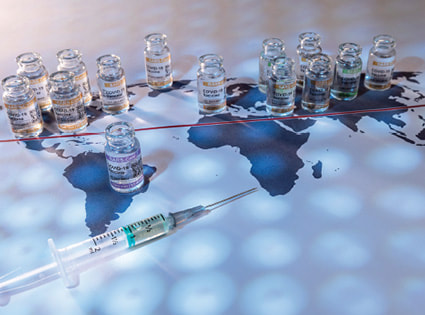Everyone deserves a vaccine
There is hope for a world in which everyone who wants a vaccine can get one. Currently, this is not the reality. Amnesty International highlighted that around 55% of people in rich countries are fully vaccinated, while in lower-income nations, fewer than 1% of the populations have been vaccinated. We live in a world of vaccine inequity, but why?
Wealthy countries, like the U.S., have more resources and negotiation power to guarantee vaccines, resulting in less access for middle/lower-income countries. This is known as vaccine nationalism. South Africa is a prime example of what a nation without access to vaccines could look like. With low vaccination rates, the nation saw the emergence of the highly infectious Omicron variant that overwhelmed the country’s healthcare system. Right now, organizations like COVAX are leading the race to combat vaccine inequity. COVAX aims to vaccinate 20% of the world’s poorest countries by gathering donated vaccines from wealthy countries, and the U.S. leads vaccine donations to COVAX with 790 million doses. However, COVAX has contributed less than 5% of all vaccines administered globally and missed its 2 billion target for 2021. Critics of COVAX claim that lower income countries, such as those in Africa and South America were not adequately consulted. Many healthcare workers and at-risk groups in countries such as Namibia, Nigeria, and Gambia were unable to receive their second dose due to large-scale delays and confusion. Despite COVAX’s efforts, less than 1 percent of COVID-19 vaccine doses globally have been administered in low-income countries. According to researchers, many people in lower/middle income countries will not receive vaccines until 2023 or later. Inequitable vaccine distribution has affected the world’s most vulnerable people. We are seeing the emergence of variants that increase the risks of infection for unvaccinated people globally. Viruses can mutate when they infect people, producing variants that could evade vaccines. For instance, the Omicron variant has thirty spike protein mutations, and preliminary data suggest that vaccines are less effective against it. Vaccines still in many cases prevent hospitalization and serious illness, but what about the next variant? We might see the emergence of a deadlier variant that doesn’t respond to vaccines. Each of the different countries where COVID is rampant due to low vaccination is somewhere a new deadly variant could emerge. How do we go about solving this? Many experts have provided suggestions for how we can increase vaccine equity to prevent the emergence of deadly variants. For example, vaccine manufacturers should prioritize fulfilling contracts to COVAX and AVAT (African Vaccine Acquisition Trust -an initiative by the African Union to secure vaccine doses and vaccinate at least 60% of Africa’s population.) There needs to be increased transparency in vaccine contracts and vaccine pledge fulfillment from G7, an intergovernmental political group consisting of the 7 wealthiest countries, and dose-sharing countries, and an elimination of export and trade barriers of COVID vaccines to other countries. The only way to get out of this pandemic is to vaccinate globally. We can start by advocating to elected officials and pharmaceutical manufacturers to prioritize vaccine distribution to low-income countries. There is hope for a world in which we work together to protect each other. |
